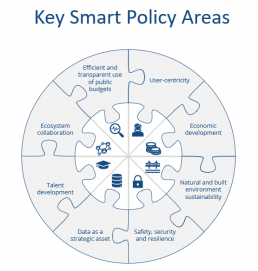European cities and communities have followed their smart city dreams for more than 10 years, but have had a hard time demonstrating the impact of these innovations on liveability, sustainability and prosperity.
The reason for this bumpy road to the future has been a disconnect between technology supply and technology demand. The former has stretched the “art of the possible” and the latter has struggled to keep pace and distinguish between hype and the truly beneficial innovations that could lead to positive outcomes that matter for people and businesses.
What European regional and city governments need is a bottom-up approach that looks at the real needs of neighbourhoods, the population and business. Smart solutions and services should then be iterated, drawing on the skills and resources of the city’s innovation ecosystem.
In such a fluid model, it’s important to design policies that create positive incentives for technology innovation, support effective governance mechanisms, involve citizens in decision making, ensure digital and data will be applied in a trusted and transparent manner, and help to nurture the local innovation ecosystem.
These policies are more important than ever now that EU regulators and governments are aiming to get a firmer grip on the ICT industry as a whole. This is because critical political, social and economic questions are being asked about the dominant role of global technology companies, the risks of algorithmic bias and misinformation, the balance between digital sovereignty and the speed and cost of innovation, and the twin digital-green transition.
8 Key Smart Policy Areas
We have identified a checklist and related global best practices for eight key smart policies that European city and community leaders should put in place to maximise the benefits and tackle the risks of innovation.
- User-centricity. City leaders should put in place effective laws, frameworks and governance mechanisms to create personalised and effective city services and enable bottom-up participation in community decisions and budget planning.
- High-value industries. City leaders should offer incentives, such as grants and tax breaks to economic development zones, to attract skilled workers and inject technological innovation into the city’s strategic industries.
- Talent development. City leaders should prioritise building a talent pipeline to support digital skills in the public sector, high-value industries and the knowledge economy as a whole.
- Natural and built environment sustainability. City leaders should create and adapt planning procedures and tools to ensure that the city’s infrastructure and built environment are sustainable and have both a physical and digital blueprint.
- Security, safety and resilience. City leaders should take a risk-informed approach to smart solutions and services, and integrate a digital layer into all disaster risk management plans.
- Data as a strategic asset. City leaders must create the right governance frameworks to share data internally and with the ecosystem and put digital rights at the core of the city’s data use.
- Ecosystem collaboration. City leaders should establish innovative procurement procedures and forums to collaborate with private partners, civil society and academia on the city’s key challenges.
- Measuring and driving impact. City leaders should integrate internationally recognised KPIs into project planning, performance management and evaluation, and measure the city’s overall intelligence, liveability and sustainability.
Cities that design smart city policies to enable a value-based and people-centric approach to technological innovation will deliver impact in terms of quality of life, sustainability and prosperity. Those that do not will be left with a gap between visionary strategies and disconnected pilots.
Join IDC experts and public sector leaders from around Europe at the IDC Government Summit to learn more about the smart policies that will empower governments and cities to realise the value of digital transformation. Read our study for more information (subscription required).
For more information, please contact Max Claps or Louisa Barker, or head over to https://www.idc.com/eu and drop your details in the form on the top right.



